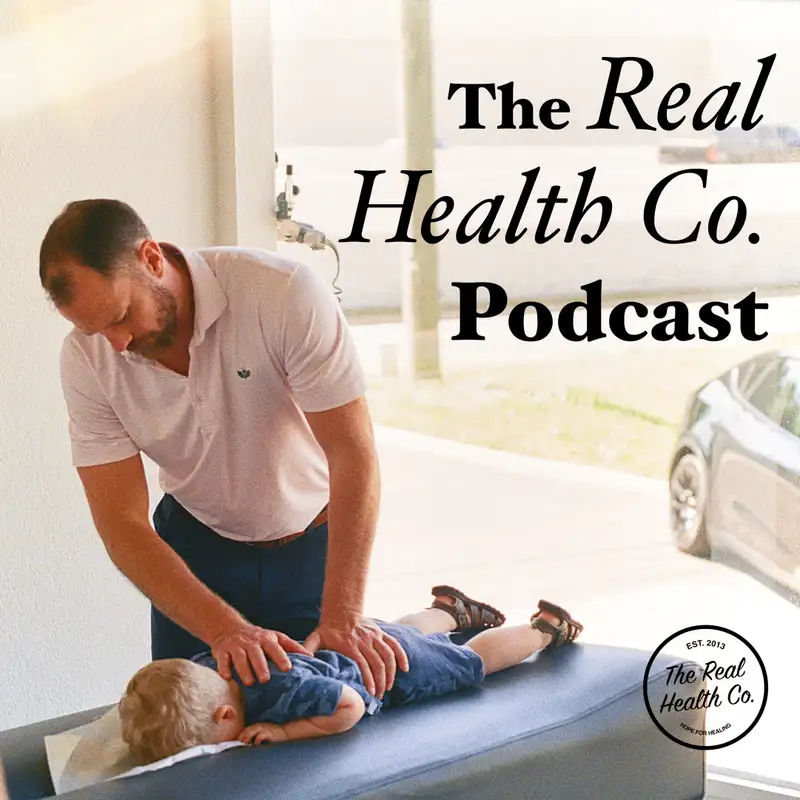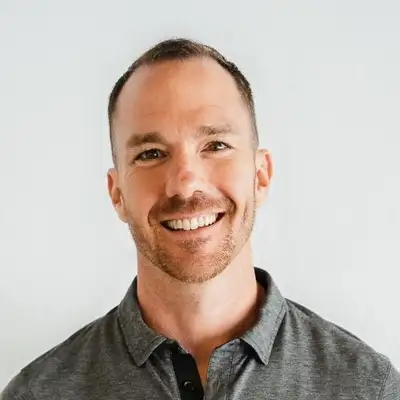 Episode 65
Episode 65
· 13:48
Welcome back to another episode of the Real Health Podcast. Hey, so we're gonna continue our discussion in this kind of world of photobiomodulation, but we're gonna talk about the sun. And one of the big things that I hear from patients is, "Hey, is it true that like, sun causes cancer or does sunscreen cause cancer?"
Dr. Barrett:And just this whole idea of "should I protect myself with sunscreen? Is there natural forms of it?" So we're just gonna kinda unpack this within 15 minutes, of "does sun cause cancer, does sunscreen cause cancer, and what to look for when choosing, like, options to protect the skin" because the reality is, as we talked about - if you if you didn't listen go back 2 episodes - and learn about light light therapy in general, but we're gonna kind of hang out in this space called ultraviolet light. And ultraviolet light is UV, what we hear UVA, UVB, and that is that the sun produces and it has damaging effects to our body. But so we're gonna frame this out, and we're gonna talk about really what happens in, like, melanoma, or squamous cell carcinoma, or basal cell carcinoma cases, and that's in skin cancer.
Dr. Barrett:It is true that, the sun exposure, UVB exposure, ultraviolet light exposure does increase your risk of cancer. But let's unpack this a little bit and have a have some understanding behind what's what's really happening. So your skin is the largest organ in your entire body. It's the largest organ. So it is a living tissue that has cells, just like every other cell in the body.
Dr. Barrett:And inside these cells, there's protective mechanisms. We talked about this on the last episode, but that protective mechanism is what we call antioxidants. When our body is harmed, damaged, let's just say we consume a toxin, it can create free radical damage or oxidative stress. These are the terms we use in science to explain that your cells are being damaged or harmed. That oxidative stress is quenched. It's mitigated with antioxidants. And so a high level of antioxidants are very protective against damaging effects of oxidative stress. Oxidative stress comes from rancid seed oils, so peanut oils, vegetable oils, comes from heavy metals, chemicals, valates, you know, BPA, glyphosate: comes from infections. Infections can induce oxidative stress and inflammation.
Dr. Barrett:And so what happens is a lot of times our skin itself accumulates toxic load, not just what we put on our skin, which can be very toxic. We'll talk about benzene here in a second. But honestly, what we put in our body affects our largest organ. It's absorbed in our skin. And so if we have oxidative stress levels that are high inside internally in our body due to poor nutrition, poor lifestyle, and toxic habits, well, that's going to manifest itself on your skin.
Dr. Barrett:And then when your skin is therefore exposed to the sun, those two come together and they create a kind of like this collision of stress, oxidative stress, and UV rays, and that over time starts to damage your DNA - or really damage your mitochondria. This is the cause of cancer. When we look at research with cancer, I've mentioned before, but cancer is a metabolic disease. It's a metabolic issue. It's an issue within the mitochondria, and the mitochondria are those power plants within your cells that create energy.
Dr. Barrett:When those are damaged, your DNA is is altered and damaged, and now we have - like - mutated cells. Then this is cancer. So if we have high toxic load, we get UV exposure, and the cells itself on the skin can then start to become damaged, so much so that our antioxidant status is low because we don't eat clean. We don't have a bunch of healthy antioxidants coming to our body. So then our protective barrier is broken down, and, therefore, we're set up for cancer.
Dr. Barrett:So does the sun cause cancer? Well, yes and no. In and of itself, sun or UVB rays have to be combined with a toxic environment, and those two come together to increase significantly your risk of cancer. You can actually type in "antioxidants and skin cancer," and you'll see PubMed research show that high antioxidant load decreases your risk for skin cancer. So the most important thing to to remember here is what you are going back to 5 pillars putting in your body nutritionally, how you train, how you sleep, chiropractic care, detoxification lifestyle, those 5 pillars are critical at preventing cancer, specifically even skin cancer.
Dr. Barrett:Now what's, like, the best way to protect your skin? Right? Because we we don't want to just bake in the sun all day. There is associated risk of sun exposure and skin cancer, so we don't wanna just bake all day. So what do we do?
Dr. Barrett:Do we wear sunscreen? Do we wear sun protective clothing? And then for for me, this goes back to, I think sun protective clothing is best because you're not putting any chemicals on the skin. You also, when you when you if you're not using sun protective clothing, then when we start talking about this world of sunscreen, it's important to have understanding about what sunscreen does and what it doesn't do. And that's where we get into this conversation SPFs and "should I get SPF 50 or 15 or 5 or 25?"
Dr. Barrett:And here's how we're gonna break this down. The first is I think you should slowly accumulate to the sun by building a base tan. Research does show that building a base tan mitigates the effects of the burn burning by 2 to 3x. So if you don't have a base tan, let's just say it takes you 20 minutes to burn in the sun. If you have a base tan, it could take 60, even 80 minutes to burn.
Dr. Barrett:So a base tan is important because then what we're really establishing is if you're only on the sun for 45 minutes or an hour, well, your ability to be like sun protective is a lot higher. So sun protective clothing's great. Having a base layer or base tan is great. And then sunscreen.
Dr. Barrett:This conversation of sunscreen is 1: We were in Hawaii a few months ago, and we were doing some snorkeling and some free diving. And so we're putting on sunscreen. And over there, man, they're really passionate about it. But here in here in the inland states, we're not as passionate about sunscreen, and most people know its effects on coral and sea life. The chemicals in sunscreen directly interfere with with the life of corals and reefs and urchins and fish to the point where it's actually destroying coral reefs.
Dr. Barrett:So when you put on this, like, I don't know what what are the common big pharmaceutical Johnson & Johnson brands out there. Whatever you're putting on your body that's like super high SPF, you know, aerosol based spraying it and then jump into the ocean, that those chemicals are directly impacting the life of the ocean. And so for the first point of reference here is make sure you're putting on a reef safe sunscreen, especially when you obviously are in water, ocean water. Okay? Any body of water outside of your pool.
Dr. Barrett:Reef safe sunscreen is very important for the health of our planet. Okay. So that's first. The second, you don't want to just be reef safe, but you also want to be, have have a natural based sunscreen. Okay?
Dr. Barrett:When you look at sunscreens, there are carcinogenic chemicals that have been found in sunscreens. Johnson and Johnson had to pull it off the shelves for instance. The one, Neutrogena is another is another one. And when we look at what was in it, it's benzene. Benzene was a chemical that was added to these sunscreens that are known carcinogens.
Dr. Barrett:So imagine this, you're putting sunscreen on your body, and then that Benzene is being absorbed into the skin. It is altering your mitochondrial health, creating oxidative damage, and inducing mutated cell growth that can end up in skin cancer. You are putting a, quote, unquote, skin cancer protective product that causes skin cancer. Right? Isn't that wild?
Dr. Barrett:So just make sure that you're getting a natural based sunscreen, specifically, the mineral based one that you'll see is called zinc oxide. Now keep this in mind. When looking at sunscreens, there's zinc oxide, which is reef safe, and there's nano zinc oxide. And, really, it's just the size of the particle of zinc. The nano one is gonna be, like, less than a 100, in terms of the size.
Dr. Barrett:So as long as it's not nano zinc oxide, it's just zinc oxide, then coral can absorb that, and it doesn't alter their internal genetics that then can create, in essence, induce damage and death to, to coral reefs. So the one you're gonna see out in the market that's the most popular and cleanest are gonna be your zinc oxide based or mineral based sunscreens. Just make sure it's not nano zinc. When choosing SPFs, just kind of point number 4 here, when choosing SPFs, is there any benefit to doing like a 50 SPF, which is 50 times longer? Or if if you're out in the sun for an hour, an SPF 50 technically is 50 hours of protection.
Dr. Barrett:That's not true. Research shows that the maximum protection for sunscreen is about 2 hours. So regardless of the SPF load, you're gonna if you're gonna in the sun more than 2 hours, you're gonna reapply. Okay? So the SPF really doesn't matter when you look at 50 versus 20. It's all the same.
Dr. Barrett:So when kind of summarizing this, idea of, hey. Does does does sun cause cancer? Does, do I wear sunscreen? Okay.
Dr. Barrett:Again, internal environment is so important. Make sure you're eating well, taking tons of antioxidants. Antioxidants are the most important thing to be sun protective against cancer. Antioxidants are vitamin a's and c's and e's and zinc and selenium. And so make sure you're consuming a plant rich diet that's full of these polyphenols and antioxidants, and green tea is fantastic to support your antioxidant load.
Dr. Barrett:Sun protective clothing, reef safe and natural based s SPF sunscreens. And if you do those and you're living a healthy lifestyle, you can significantly mitigate your risk for skin cancer. Hey, that should be a nice summary for you. If you have any questions, as always, feel free to reach out to one of the offices or direct message us on any social media platform.
Dr. Barrett:We appreciate you for listening. Have a great day.

Listen to The Real Health Co. Podcast using one of many popular podcasting apps or directories.